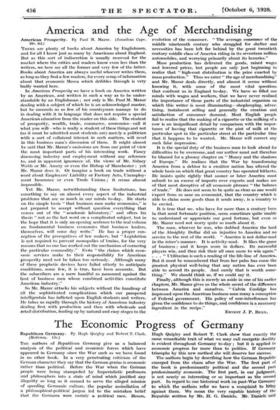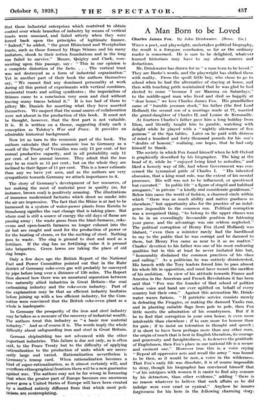The Economic Progress of Germany Republican Germany. By Hugh Quigley
and Robert T. Clark. (Methuen. 15i;) THE authors of Republican Germany give us a balanced analysis of the political and economic forces which have appeared in Germany since the War such as we haVe found in no other book. 'In a very penetrating criticism of the German character they say that the German genius is economic rather than political. Before the War when the German people were being stampeded by Imperialistic professors and philosophers into a state of mind which justified any illegality so long as it seemed to serve the alleged mission Of speeding Germanic culture, the popular assimilation of a 'philosophical-political jargon led to the mistaken belief that the Germans were mainly a political race. Messrs. Hugh Quigley and Robert T. Clark show that exactly the same remarkable trait Of what we may call energetic doCility is evident throughout Germany to-day ; but it is applied to economic progicis far more than to politics. If Germany triumphs by this new method she Will deserve her -sireeesi.
The authors begin by describing how the German RePublic emerged from thechaos after the War. The first part of the book- is predominantly political and the second part predothinantly- economic.- The first part, in our judgnienf, is not nearly' so interesting or so important as the second Part. In regaretto one historical work On Post-War Germany to which the "authiois tefer we have a 'cainplaint to ming against then; We • mean the very capable history of the Republic written -by Mr. H. G. Daniels. 'lift. .Daniels said
that those industrial enterprises which contrived to obtain control over whoie branches of industry by means of vertical trusts were unsound, and failed utterly when they were forced back upon the principles of legitimate finance. " Indeed," he added, " the great Rhineland and Westphalian trusts, such as those formed by Hugo Stinnes and his many imitators, shook to their rotten foundations and in the long run failed to survive." Messrs, Quigley and Clark, com- menting upon this passage, say : " This in our opinion is a complete distortion of the facts. . . . The vertical trust was not destroyed as a form of industrial organization." Yet in another part of their book the authors themselves say, " We cannot fmd any dominant personality at work during all this period of experiments with vertical combines, horizontal trusts and selling syndicates ; the imperialism of Stinnes came to a conclusion very soon and died without leaving many traces behind it." It is too bad of them to pillory Mr. Daniels for asserting what they have asserted themselves. We suspect that the usual snares of collaboration were not absent in the production of this book. It must not be thought, however, that the first part is not valuable. It is. It is written on a theme, suggesting dimly such a conception as Tolstoy's War and Peace. It provides an admirable historical background.
Now let us turn to the economic part of the book. The authors calculate that the economic loss to Germany as a result of the Treaty of Versailles was only 11 per cent. of her annual productive capacity, and in all probability only 11 per cent. of her annual income. They admit that the loss may be as much as 15 per cent., but on the whole they are inclined to their figure of 11 per cent. This is a lower estimate than any we have yet seen, and as the authors are very sympathetic towards Germany we attach importance to it.
The story of Germany's development of her resources, of her making the most of material poor in quality (as, for instance, brown coal) is positively amazing. The illustrations of immense modernized factories which shoot no smoke into the air are impressive. The fact that the Rhine is at last to be harnessed in a system of water-power plants from Kembs to Strasbourg signifies the vast change that is taking place. But where coal is still a source of energy the old days of flame are passing away ; the waste gases from the blast-furnaces, coke- ovens and open-hearth furnaces no longer exhaust into the air but are caught and used for the production of power or for the heating of steam, or for the melting of steel. Nothing goes to waste. The slag is ground to dust and used as a fertilizer. If the slag has no fertilizing value it is pressed into briquettes. Green lawns are taking the place of old slag heaps.
Only a few days ago the British Report of the National Fuel and Power Committee pointed out that in the Ruhr district of Germany coke-oven gas will probably be conveyed by pipe before long over a distance of 150 miles. The Report then showed how there was an unnatural separation between two naturally allied industries in Great Britain—the coal Carbonizing. industry and the coke-oven industry. Part of the explanation may be that an efficient industry hesitates before joining up with a less efficient industry, for the Com- mittee were convinced that the British coke-oven plant as a whole is inadequate.
In Germany the prosperity of the iron and steel industry may be taken as a measure of the recovery of industrial wealth. The authors treat this industry as " a basic raw material industry." And so of course it is. The words imply the whole difficulty about safeguarding iron and steel in Great Britain.
German shipbuilding has not advanced with the other important industries. This failure is due not only, as is often said, to the Peace Treaty but to the difficult7 of applying rationalization to the production of units winch are neces- sarily large and varied. Rationalization nevertheless is Germany's trump card. When rationalization becomes a kind of super-rationalization, as it almost certainly will, and overflows ethnographical frontiers there will be a new guarantee against war. The authors may not be far wrong in foreseeing that when the greater part of Europe becomes one enormous flower zone a United States of Europe will have been created by a method entirely different from that which most poll- ticians_are contemplating.























































 Previous page
Previous page